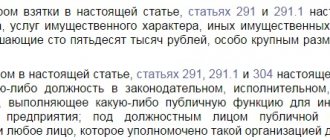Article 293 of the federal criminal law provides for a new type of punishment for citizens related to their professional activities - for the negligent attitude of persons occupying certain positions to their duties. The specificity of the legal relations to which this rule applies, as well as the complex nature of the crime, give rise to numerous discussions among legal scholars and practicing lawyers, which justifies the presence of a huge number of voluminous comments on the article in question. What semantic side of negligence is illuminated by the comments of scientific workers? Negligence of Article 293 of the Criminal Code of the Russian Federation, comments can be read on the Internet.
Commentary on Article 293 of the Criminal Code of the Russian Federation
The article has only one comment regarding the amount of damage:
- More than 1.5 million rubles is considered a large amount.
- More than 7.5 million – especially large ones.
Please note that the above information is marked as a note in the law.
Additionally, the following comments can be highlighted:
- Crime lies in both action and lack thereof. The latter represents a negligent attitude towards official duties or the absence of any action at all. For example, inattention when checking fire safety can lead to tragedy.
- Before accusing an official, his responsibilities should be outlined. If the inaction is due to the fact that the citizen is not obliged to do something (for example, a fireman is not obliged to detain a thief), prosecution is impossible.
- The ability to perform duties consists of objective factors (external conditions: production conditions, volume of work, protection of goods, etc.) and subjective ones (citizen qualifications, experience, knowledge). If the negligence occurred due to lack of knowledge or unsuitable objective conditions (for example, the owner of the company refused to rebuild a dangerous building), the person cannot be punished.
- The subjective side is negligence or frivolity. In the first case, the citizen does not foresee the consequences of his actions (he is inattentive), and in the second, he foresees, but hopes that everything will work out.
- A subject is only a person holding a certain position. The object can be social relations, property, health or even people's lives.
Corpus delicti
A negligent attitude towards one's position is a significant obstacle to the development of the entire modern society. Some may find it too loud that the concept of negligence becomes a consequence of hundreds and thousands of human victims.
During the preliminary investigation, the prosecution faces a difficult task. Firstly, it is necessary to find out whether there were circumstances that prevented the citizen from fulfilling his professional duties. If a person was unable to fulfill his official duties for objective reasons, then bring him to justice under Art. 293 is not possible.
An illustrative example is the actions of a doctor, as a result of which the patient died. If it turns out that during the operation there was an electrical failure and the body's support system was turned off, then the doctor's actions will not fall under the article of negligence.
At the same time, investigators need to prove the existence of insurmountable circumstances. This requires numerous examinations. It is for this reason that cases related to negligence are delayed, and often the courts choose a not entirely objective punishment. And all because negligence itself belongs to the category of difficult to qualify acts.
To clearly define what negligence is and how it differs from similar elements of a crime, it is enough to analyze the consequences that have occurred. In addition, the subjective side plays an important role in bringing liability for negligence.
If there is negligence in the actions of the suspect, then there cannot be negligence in his actions, since negligence in work means indifference. .
Concept and characteristics
Negligence - what is it?
Negligence is considered to be the improper performance (or failure) by an employee of his job duties.
This is a crime for which the perpetrator will have to be punished.
However, this only happens if this situation entails certain consequences that violate the rights of third parties. This could be material losses to the victim, or harm to his health and life.
The concept of criminal negligence, as well as the degree of responsibility for it, is regulated at the legislative level, and the more serious the negative consequences that occur, the more severe the punishment the perpetrator will face.
Commentary on Article 293 of the Criminal Code of the Russian Federation
Commentary edited by Rarog A.I.
1. The objective side of negligence is formed by three signs:
a) a socially dangerous act in the form of action or inaction;
b) socially dangerous consequences in the form of causing major damage or other significant violation of the rights and legitimate interests of citizens or organizations or legally protected interests of society or the state;
c) the causal relationship between the act and the consequences.
2. Negligence is most often expressed in inaction, when the culprit does not perform those actions that he should have performed due to the duties assigned to him. However, negligence can also be expressed in the form of an action - the law indicates that not only failure to fulfill official duties, but also their improper performance is punishable. In this case, the culprit fulfills his official duties, but does it in bad faith.
3. The law proceeds from the fact that negligence is a manifestation of dishonest or negligent attitude towards official duties. Therefore, the Plenum of the Supreme Court of the USSR, in Resolution No. 4 of March 30, 1990, indicated the need, in proceedings in cases of this category, to establish the range and nature of the official rights and duties of an official, as well as the regulations governing them. The Supreme Court of the Russian Federation adheres to a similar position (BVS RF. 1997. No. 11).
4. The condition for liability for negligence is a real opportunity to properly perform one’s official duties. If in a particular case such a possibility is absent, the corpus delicti of the crime in question is also absent (BVS USSR. 1975. No. 5; 1976. No. 6; 1990. No. 3).
5. As a result of non-fulfillment or improper performance by a person of his official duties, socially dangerous consequences must be caused in the form of a significant violation of the rights and legitimate interests of citizens or organizations or legally protected interests of society or the state (see paragraph 5 of the commentary to Article 285 of the Criminal Code), as well as major economic and environmental damage, the value of which in accordance with the note to Art. 293 of the Criminal Code exceeds 100 thousand rubles. The wording of socially dangerous consequences in the current version of Part 1 of Art. 293 of the Criminal Code (Federal Law of April 8, 2008) is a legislative misunderstanding, since major damage is a special case of a significant violation of law-protected interests - a traditional consequence of official crime for domestic criminal law. Having abandoned the idea contained in the Federal Law of December 8, 2003 about a significant limitation of the scope of liability for negligence, the legislator did not take this circumstance into account. It is necessary to establish the existence of a causal relationship between these consequences and the official’s act.
6. The crime is completed at the moment of the onset of socially dangerous consequences.
7
The subjective side of negligence is expressed in both types of negligence (frivolity, negligence).
8. The subject of the crime is a special one - an official (see paragraphs 8 - 11 of the commentary to Article 285 of the Criminal Code).
9. Qualified negligence (Part 2 of Article 293 of the Criminal Code) occurs when the consequences such as serious harm to health or the death of one person are carelessly caused. 10. A particularly qualified element of negligence (Part 3 of Article 293 of the Criminal Code) provides for the careless infliction of the death of two or more persons by the same act.
What does criminal negligence include?
Negligence under Article 293 of the Criminal Code of the Russian Federation is described in the comments as improper performance or failure (both full and partial) by an official to fulfill his labor duties.
From the proposed definition, the following characteristics of Article 293 of the Criminal Code of the Russian Federation can be distinguished:
- the official fails to act in relation to the obligations imposed on him by the employment agreement or contract (for example, an unprovided service that is an integral part of the labor function);
- the official fails to act in relation to part of the obligations assigned to him by the employment agreement or contract;
- an employee (of strictly defined professions) performs his job duties improperly (in violation of any norms or rules for the implementation of certain job functions);
- subjective aspect, consisting in the fact that all the above acts should not be of an intentional nature of guilt, that is, the subject of the crime could not perform (inaction), performed his professional duties in an inappropriate way consciously, implying the likelihood of adverse consequences of such actions or inactions, or could not realize what his actions will lead to, but in any case he should not desire their occurrence;
- a person who can be found guilty of neglect of authority conferred by professional activity must be an official, that is, the crime is directly related to the work of the accused.
The official accused of this crime must have officially documented job responsibilities and functions.
What could be the reasons for neglect of labor duties?
The commentary justifies negligence under Article 293 with the following possible reasons:
- disdainful attitude towards work;
- careless behavior when performing a job function;
- frivolity of an official in relation to labor functions assigned by professional activity;
- deliberate inattention or disregard for performing actions necessary to achieve the result of professional activity.
It is necessary to point out that abuse of official position may also give rise to liability, but in this case the provisions of Art. 285 of the Criminal Code of the Russian Federation. In Art. 293 of the Criminal Code of the Russian Federation, the commentary notes that in practice there are situations when, during the investigation in a case of negligence, it turns out that there was precisely an abuse of power, which means that the investigator has changed the incriminated article.
Who can be the subject of a crime under Art. 293 of the Criminal Code of the Russian Federation
As indicated above, a person who can be found guilty of negligence is, from the point of view of criminal law, a special subject.
The specificity of the perpetrator in this category of cases is emphasized by the presence of a certain number of duties assigned to him officially and directly related to his work activities.
In judicial practice, as a rule, the following three types of negligence are distinguished:
- Responsibilities performed inappropriately or unfulfilled are assigned to the culprit in connection with his position.
- Such responsibilities are specific to specific types of profession.
- A labor function not performed or performed in bad faith is provided for by the service performed by the culprit.
From the above categories it follows that official negligence is charged against the accused, who, in connection with their position, are obliged to perform the duty of exercising administrative functions, economic powers or actions of an organizational nature (for example, an accountant of an enterprise).
For official negligence, a court sentence is passed on people holding government positions (the subject is a civil servant).
And professional negligence is charged against doctors (for example, failure to provide necessary medical care), police officers, traffic police officers, and employees of the educational sector (for example, teachers).
Negligent attitude towards official duties
The most common causes of negligence are:
- Lack of motivation and unwillingness of the employee to work well.
It is worth noting: this also includes poor working conditions: lack of tools for work, violations of labor regulations.
- Lack of sufficient experience or qualities, manager’s mistakes when choosing an employee for this position.
- Inattention of the citizen himself for some reason, for example, due to personal problems.
- Lack of control: Knowing that he will not be checked, a person may be negligent in his work.
Please note: in addition to criminal punishment, the organization may limit itself to a reprimand, deprivation of bonuses or other disciplinary action. Typically, such punishment is imposed if the damage is minor or does not involve serious violations.
Negligence is the careless or inattentive attitude of an official to his duties. It can lead to both small problems (such as a client leaving or a fine) and serious problems, such as the death of people due to medical negligence.
Watch the video in which a case under the article “Negligence” is considered using a specific example: https://www.youtube.com/embed/MOgqjeZQytY
Sanctions for criminal negligence
Article 293 of the Criminal Code (the current version) consists of three parts, the first of which fixes the act and punishment of light forms, and the second and third – acts with aggravating circumstances and more severe sanctions.
Also part 2 of Art. 293 of the Criminal Code of the Russian Federation provides for a sanction in the form of deprivation of the right to hold a certain position for a period appointed by the court.
Impeccable performance by a person of the entire range of labor duties of any profession can be found extremely rarely, however, the number of convictions made under Article 293 of the Criminal Code of the Russian Federation is not so large. This situation is justified by the application of this rule only in cases of large-scale neglect of one’s labor functions, which entailed significant consequences for one person or society as a whole.
Part 1 art. 293 of the Criminal Code of the Russian Federation
Negligence, that is, failure or improper performance by an official of his duties due to dishonest or negligent attitude towards service or duties in office, if this entailed causing major damage or a significant violation of the rights and legitimate interests of citizens or organizations or legally protected interests of society or the state, is punishable a fine in the amount of up to one hundred twenty thousand rubles or in the amount of the wages or other income of the convicted person for a period of up to one year, or compulsory labor for a term of up to three hundred and sixty hours, or corrective labor for a term of up to one year, or arrest for a term of up to three months.
Characteristic signs
This offense has its own characteristic features and characteristics, which are divided into objective and subjective. This:
- Poor quality work.
- Causing harm to other people and violating their interests.
- The connection between the unlawful act and the negative circumstances that followed it.
- No criminal intent.
That is, if an employee who performs certain functions poorly did not want a negative situation to occur, but foresaw such a possibility and did not take any action to prevent it.
The subject and subjective side of the crime
A preventive measure for negligent actions may be taken against an official who has not properly fulfilled his official duties. From this definition it follows that only a person holding a certain position can act as a subject. In this case, we can talk about the presence of a special subject.
The subjective side is expressed in another form of negligence (negligence). A frivolous attitude towards one's duties is a qualifying sign and makes it possible to distinguish, for example, negligence from abuse of power
In the latter case, the offender takes action with an understanding of the possible consequences.
The presence of a sign of frivolity in the case becomes the main qualifying factor.
The peculiarity of the subjective side helps the investigation to distinguish between negligence and official forgery. Moreover, both of these crimes encroach on the interests of the enterprise or the state. As a result of official forgery, an official may violate his job description or commit other actions that are detrimental to the institution or organization in which he worked.
Negligence is characterized by exactly the same signs.
Attention! The difference between the two acts lies in intent. In the first case, there is room for direct intent
Negligence can only be expressed by negligence, as established in the disposition of Art. 293.
Who is liable?
Punishment is imposed on those persons who perform work improperly if this results in harm to third parties .
It is important to take into account that sanctions can only be applied to those employees whose functions include performing certain actions (this must be documented, for example, in an official instruction).
If it is proven that work was performed poorly and is not within the scope of the person’s duties, this is not considered negligence .
Responsibility for inattention to one’s own activities applies to the following groups of persons :
- Civil servants, people holding positions in the management structure of the state.
- Heads of organizations whose functions include organizational, managerial, material and economic activities in a particular organization.
- Skilled workers, for example, teachers, doctors, engineers, law enforcement officers.
How does practice work out?
In the process of studying the practice of courts, it becomes obvious that heads of educational institutions, personnel of medical institutions, bodies of inquiry, and investigation most often become the perpetrators of this type of crime. In addition, most of them have positive characteristics from their place of work, have no previous convictions, repent of their actions and help the investigation.
It is difficult to give a scientific explanation of the reasons for this pattern - a frivolous attitude towards the performance of their tasks by staff, the confidence that they will “get over it”, but responsibility will not come at all. Perhaps the reason for this phenomenon is the lack of professional development activities, the lack of real certification of management employees, the workload of other tasks, or simple indifference?
Here are just some examples:
- The Berdsk City Court of the Novosibirsk Region sentenced Mr. Kh. to criminal punishment due to his guilt in negligence. Convict Kh., appointed head of the health camp, was careless about creating safe conditions for children in the medical institution, directly related to the safety and health of children. The result of such irresponsibility was an accident - the child fell from the second floor, which caused injuries that resulted in permanent disability.
- In the Perm region, a court acquitted the director of an orphanage on charges of negligent failure to perform duties on the basis that there was no real opportunity to fulfill the relevant duties. The bus driver, transporting children to the competition site, set off ahead of schedule and was involved in a traffic accident, which resulted in the death of several students. Despite the fact that the director was responsible for ensuring the safety of transportation, the citizen could not influence the events, since she was not notified of the change in the bus departure time.
- The court of the Khanty-Mansi Autonomous Okrug sentenced police officer N. to liability under Article 293 of the Criminal Code of the Russian Federation. According to the case materials, victim G. was taken to the police station for committing an administrative offense, namely being drunk in a public place and minor hooliganism. The victim complained about his health condition; in response, N. called an ambulance, acting in accordance with internal instructions. Later, N. wrongfully canceled the call of medical workers, explaining that he did not realize the severity of G.’s condition, since he violently resisted arrest, attempted to attack employees, and only after being taken to the department fell to the floor without the ability to move independently. Such passivity in N.’s actions became the basis for the city court’s decision to punish him with a fine of thirty thousand rubles, supported by the appellate court.
- There are often cases where negligence borders on fraudulent activities. Thus, guests of a hostel in the Astrakhan region repeatedly complained about the dilapidation of the building and the collapse of the walls. However, after reconstruction under the leadership of P., people from dilapidated houses located in a prestigious area were moved into the hostel. After which P. received permission to build a shopping center on the vacated site, in which investigators saw signs of fraud. In 2009, a span of the building collapsed, causing death and serious injury to many people. The chief specialist of the housing inspection service of the construction and housing supervision service, who recognized the house as suitable for habitation, was convicted of a crime under norm 293 of the Criminal Code of the Russian Federation.
It is obvious that the carelessness shown by officials, managers and other employees whose decisions affect our rights leads to very sad consequences, because their actions encroach on the constitutional rights of citizens, the normal functioning of government institutions and entities. Thorough criminal proceedings, establishing all the circumstances of what happened is the basis necessary for the correct qualification of the act and a fair court decision.
Arbitrage practice
Determining that an action or inaction constitutes negligence is quite difficult. Nevertheless, in practice, competent specialists cope with this and every year the courts consider about 100 criminal cases on charges of negligence on officials.
Examples of this include:
- Citizen N. contacted the police with a statement about the disappearance of her 16-year-old daughter. Investigator K. accepted the statement, but hoping that the daughter of citizen N. would take a walk and return (this has happened before), he did not open a criminal case. A week later, the missing woman was found dead in the basement of one of the houses. Death occurred as a result of dehydration. The court came to the conclusion that if investigator K. had given orders for the search in a timely manner, then such a result could have been avoided. Former investigator K. was convicted under Art. 293 part 2. The court sentenced him to 3 years in prison.
- The doctor on duty M. ignored the need to make an evening round. A patient died in his department at night. The forensic medical examination confirmed that if the doctor had carried out the rounds according to the rules, he would have been able to diagnose the deterioration of the patient’s condition. M. was found guilty by the court and sentenced to forced labor for a period of 3 years and 6 months. He was also banned from holding any medical positions for a period of 2 years.
- The person in charge of fire safety at a psychiatric hospital ignored faulty electrical wiring for a long time. The result was a fire that claimed the lives of several people. The court found the defendant guilty and sentenced him to 5 years and 3 months in prison.
Fortunately, death is not always the result of negligence. According to official statistics, there are fewer such cases.
Statistical data
In 2022, the courts considered 169 criminal cases under Art. 293: for part 1 – 106, for part 1.1 – 2, for part 2 – 49, for part 3 – 12. The statistics of decisions are as follows: 18 people were acquitted, 151 were convicted.
Those found guilty were sentenced to the following punishments:
- imprisonment – 8 people;
- suspended imprisonment – 34 convicts;
- restriction of freedom – 1 person;
- fine – 56 perpetrators;
- correctional labor – 2 people;
- arrest – 49 perpetrators;
- 1 person was sent for compulsory treatment.
Static data once again indicates the difficulty of qualifying such a crime as negligence. According to statistics, 18 people were acquitted, which is approximately equal to 15% of the total number of accused. A competent and experienced lawyer is quite capable of “ruining” the charge of negligence.
Dangerous consequences
The concept of negligence always indicates that improper performance by an employee of his duties entails undesirable consequences that cause harm to third parties.
If there are no such consequences, then the elements of the crime have not been defined, which means that it is impossible to apply certain sanctions to the negligent employee.
The most common consequences of negligent crime are:
- Material damage. The amount of financial damage can vary, from minor to particularly large (over 5 million rubles).
- Negative consequences for human health.
- Death of one or more people. Negligence resulting in death by negligence.
- Disclosure of secret personal information, which resulted in moral or material harm to the victim.
- Concealment of important circumstances related to other official crimes.









